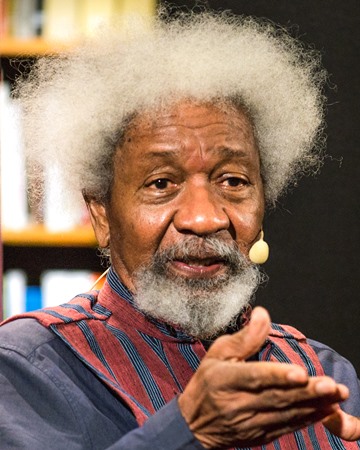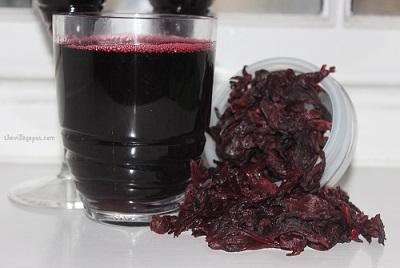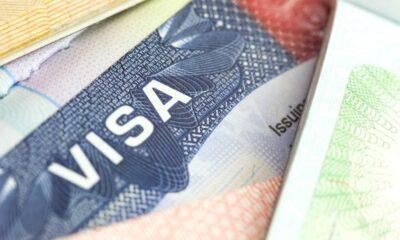Health
My 48-hour Ordeal In France Over Nigeria’s COVID-19 Permit – Soyinka
Published
2 years agoon
By
Editor
Nobel laureate, Prof Wole Soyinka, on Thursday said he was prevented from boarding at the Charles de Gaulle Airport in Paris, France, for failing to obtain what the airline staff described as a ‘permit to travel’ to Nigeria.
Soyinka spoke in Lagos on the theme, ‘COVID, technology and citizen banishment,’ during an interaction with journalists.
The essayist said although no attempt was made to banish him, he nevertheless felt like serving a decree of banishment for 48 hours that the event lasted.
Every in-bound traveller is expected to upload their COVID result on a portal created by the Federal Government, with the traveller’s details including passport, ticket numbers. At the end of the exercise, a barcode is generated, indicating a permit to travel.
READ ALSO: ASUU To Sponsor ‘Bring Back Your Children Bill’
The playwright who lamented his experience said, “Of course, there is something known as force majeure that means you cannot help it. If there are floods, or there is turbulence and your plane cannot land and it is turned somewhere else, yes we understand that.”
He added that when an individual “is prevented from entering his own country through the lapses of others, then there is problem.”
The elder statesman, who recounted two experiences, stated, “I had my vaccination, I have taken the 72 hours COVID test and I was negative. But apparently, there was one more, a new one called PCR (Polymerase Chain Reaction), which the Nigerian government had begun to insist upon.
“I was away from the country at the time. I didn’t know this. I thought I was all geared up. I couldn’t get on that plane. I had to go back to Paris. I spent three extra days in Paris before I could get back to the airport, after taking the test and getting my result.
“But it happened the second time, just about a week ago. This time, I had my PCR, and I still remained vaccinated. And of course, it did not happen to me alone; there were other Nigerians who passed the night at the airport. They couldn’t leave the airport because they had already passed through immigration.
“But at the gate, they were also turned back. This time, it was not PCR, or whatever it is called. It was that they had not gone to something called the Nigerian Travel Porter and obtained a permit to travel. Again, it was my turn. I said I have got everything, that I have the PCR. But they said no, that there was one more item which the Nigerian government now requires. So, I had to go back into Paris.
“Then I was directed where to go through a machine, and pay the necessary amount and then permission will be generated from Nigeria so that I could travel back to my own country. I rebooked, and the following morning, I was back at Air France. At the hotel, we tried to get on this porter, but we could not.”
He added that by 10am, he realised that he might miss his flight again, so he told the Air France about his challenge.
Soyinka said, “Together with Air France staff, between 10am and 2pm, we kept working. They brought their computers, some changed my password for me so that they could then try through their own but they could not. We succeeded maybe around 12 something in the receipt of the payment of my credit card being acknowledged.
“But it did not generate the permit to enter Nigeria, which has a square barcode. The process itself is really remarkable. I don’t believe that it was the Ministry of Health who created that questionnaire. I think it must be the Ministry of Internal Affairs. I invite you all to attempt to get on that portal and tell me what it has to do with COVID after the first couple of questions.
“What the majority of those questions have to do with COVID I understand. I asked them if there are other flights going to West African countries, which do not require this kind of secret service questionnaire, because that was what I consider it to be. And they said there was a flight leaving for Lome at 4.30pm. I told them to put me on it. Boarding began about 2.40pm; I carried my bags ready to go to Lome.
“In the meantime, one of the supervisors had come from the office. She was working with the phones like mad; sddenly, she broke into a sigh of relief and came running to where I was with my bags. She told me that she has good news for me, that I have been given special permission to enter my country. I don’t believe that I or any Nigerian should require special permission to enter his or her own country.”
Soyinka added that he didn’t believe that other nationals were obstructed from entering their countries the way Nigeria did for its citizens.
He added, “This is a plea to the Ministry of Health, Internal Affairs, which I am convinced must have participated in this form, to find out what is going on and why one should be subjected to this ordeal. Let us go out through the front door and come back through the front door as it is befitting to all normal citizens.
“Stop treating Nigerians like criminals and illegal immigrants who end up sleeping on couches or on the floor of the airport.’’
Commenting on the November 6, 2021 Anambra governorship poll which the Indigenous Peoples of Biafra had declared a one-week sit-at-home ahead of its conduct, Soyinka said, “We are in a mess. This country is in a mess. It is disintegrating before our very eyes. The government is floundering.”
(PUNCH)
You may like


Soyinka To Govt: Nigeria Breaking Up Informally, Stop Taking Us For A Ride


Soyinka’s Sister Dies At 90, Funeral Rites Begin Thursday


How Obasanjo, Soyinka, Akintoye, Adebanjo, Others Secured My Release — Sunday Igboho


Soyinka Taunts Obasanjo For Ordering Monarchs To ‘Stand Up And Sit Down’ [VIDEO]


2023: Atiku, Peter Obi Gave Victory As Donation To Tinubu – Soyinka


JUST IN: LP Carpets Soyinka Over Comments On Obi, Datti

By Silver Yeibake
Autism, commonly known as Autism Spectrum Disorder (ASD), is a neurodevelopmental disorder that affects communication, social interaction, and behavior. Autism is referred to as a spectrum condition since it can manifest in a variety of symptoms and abilities. While the actual cause of autism is unknown, evidence suggests that genetic and environmental factors interact to influence its development.
The risk factors include a sibling with autism, advanced age of parents, exposure to certain air pollutants and pesticides before birth, extreme prematurity, mothers with diabetes, immune system disorders or obesity, any difficulty with delivery leading to deprivation of oxygen to the baby’s brain, fever during pregnancy, lack of certain vitamins minerals during pregnancy, and certain genetic conditions, such as Down, fragile X, and Rett syndromes.
“Risk factors can not on their own cause a disease. However, they can increase the likelihood of that disease in a person.”
It is important to know that contrary to trending claims online, there is no scientific or medical evidence that vaccines or consumption of sugar are risk factors for autism.
READ ALSO: Kidney Stones: What You Need To Know
Autism is defined by difficulties in social interaction and communication. Individuals with autism may struggle to grasp social cues, maintain eye contact, and engage in typical back-and-forth conversations. Some people may also engage in meaningless, repetitive actions, such as hand-flapping or rocking, and have strong interests in specific areas.
It is essential to remember that autism is a lifelong diagnosis, but with early intervention and adequate care, people with autism can live fulfilling lives.
Autism treatment frequently includes behavioral therapy, speech therapy, occupational therapy, and social skills training. Each individual with autism is unique, thus interventions should be tailored to meet their personal needs and strengths.
In spite of the difficulties that autism can cause, many people with autism possess unique talents and abilities. Some people may succeed in fields such as music, art, mathematics, or programming, thus it is important for society to acknowledge and honor the qualities and achievements of people with autism.
In summary, autism is a complicated and diverse disorder that affects individuals in various ways. By raising autism knowledge, understanding, and acceptance, we can build a more inclusive society in which people with autism can thrive and attain their full potential.
Dr. Yeibake, Weriwoyingipre Silver.
Senior Registrar,
Faculty Of Pediatrics,
WACP
Health
Don Confirms ‘Zobo’ As Antihypertensive Therapy
Published
2 months agoon
March 10, 2024By
Editor
The Deputy Vice Chancellor, University of Nigeria Enugu Campus, UNEC, Prof. Daniel Nwachukwu, after research findings and clinical trials in both animals and human, has confirmed that Hibiscus Sabdariffa, popularly called ‘zobo’ drinks, has all the curative potentials as an antihypertensive therapy.
Nwachukwu, who is a Professor of Cardiovascular Physiology in the university, stated that the antihypertensive effectiveness of the Hibiscus Sabdariffa (zobo) was comparable to those of known antihypertensive drugs that are popular in the retail pharmacies, adding that zobo’s availability, cheapness and absence of side effects make it attractive as an alternative therapeutic agent in mind to moderate hypertensive subjects.
He however cautioned that care should be applied to avoid abuse in the consumption of Hibiscus Sabdariffa (zobo), adding that the therapy could interfere with some anti-malaria drugs while its high dose was also reported to have toxic effects on the liver and kidney.
READ ALSO: How Airline Pilots Fell Asleep Mid-flight – Safety Agency Reveals
Nwachukwu’s discoveries were contained his 201st Inaugural Lecture of the University of Nigeria with the topic “The Marriage Between the Cardiovascular System and Hibiscus Sabariffa: Let no One Put Asunder,” delivered at the moot court hall, Law faculty of the University of Nigeria, Enugu campus.
The DVC warned that Hibiscus Sabariffa consumption is not recommended for persons with low blood pressure because of its well established hypotensive action, advising that during combined therapy with antihypertensive drugs, the blood pressure, BP, must be carefully monitored.
He recommended that industrialists and investors should support large scale production of Hibiscus Sabariffa beverage and its distribution to rural communities in Nigeria, particularly since the raw materials (Hibiscus Sabariffa calyx and water) are cheap and readily available.
READ ALSO: Man Stabs Two Women To Death At A Mexico Varsity
According to Nwachukwu, “This lecture is intended to draw the public attention to our research efforts and unveiling the antihypertensive ability of Hibiscus Sabariffa which is called zobo in our common parlance. What we used for our studies was the same concentration as the locally produced zobo, and we found out that it exerted significant antihypertensive ability, in some cases even higher than the antihypertensive drugs and also did combination therapy with other antihypertensive drugs.
“What is significant is that this zobo is within us, it’s very cheap and it does not have any side effects compared to other antihypertensive agents. The raw material is just to buy zobo, prepare it under hygienic conditions, boil water and put it, sieve it and drink. It may have a sour taste but we do not encourage people to add things like pineapple or sugar in order to make it sweet, because once you do that, you are diluting or reducing its antihypertensive effectiveness.
“We have demonstrated it, both in animal studies and in humans. We are the first to do clinical trials, using mild to moderate antihypertensive Nigerians and we found it very useful. Some of the results show that one can actually use it and we equally saw that you can use it to prevent even diabetes from occurring because it reduces the rise in glucose level.”
READ ALSO: Adolescent Girls Face Risks Of Sexual Violence – UNICEF
Vice Chancellor of the University, Professor Charles Igwe while summarizing the lecture said that the lecture was in three dimensions; one on health grounds, another in academics and the third an economic value.
“Its economic in the sense that we can also begin to use what God has given us to make money. Maybe because God gave us everything in abundance in this country, we don’t recognize the simplest things God gave us in our environment. Therefore, what we are saying is that we should begin to, at all these pure water productions and incorporate zobo production so as to make money out of it.
“The university has made its contribution through our laboratories and it’s now left for the business community and the industries to come and buy into it and start widening it and make it very economic,” Igwe suggested.
Vanguard

By Silver Yeibake
Hi, did you know that Tuesday 12th March, 2024 is world Glaucoma day?Kindly avail yourself of this opportunity to learn about this important health issue as presented below:
Glaucoma is a dangerous eye disorder that damages the optic nerve, causing visual impairment or permanent blindness if not treated.
The optic nerve transmits visual information from the eye to the brain. Damage to this nerve might cause gradual visual loss that is not immediately obvious.
Worldwide, this disease affects 67 million people and contributes 6.7 million of blindness in this population. Glaucoma is the leading cause of blindness in the world.
The total number of cases is expected to increase to 111 million by 2040. Males are slightly more affected than females.
One of the basic causes of glaucoma is an increase in intraocular pressure (pressure within the eyeball), which can eventually damage the optic nerve (the nerve that makes seeing possible). This increase in pressure could be caused by an accumulation of aqueous humor, the fluid that nourishes the eye.
FROM THE AUTHOR: Food Poisoning: What You Need To Know
There are several forms of glaucoma, including open-angle glaucoma, angle-closure glaucoma, normal-tension glaucoma, and secondary glaucoma, each with unique characteristics and treatment choices.
Some of the risk factors for glaucoma include sustained elevation of intraocular pressure, family history of glaucoma, race (African, Asian), short-sightedness, long-sightedness, age over 50, previous eye injury or surgery, hypertension, diabetes mellitus, migraines, and prolonged steroid therapy.
Glaucoma symptoms may not appear until the problem has advanced sufficiently, therefore regular eye checks are essential for early detection. Blurred vision, eye pain, nausea, and light halos are some of the most frequent glaucoma symptoms. However, these symptoms might be mild or readily misinterpreted as other eye problems, emphasizing the significance of regular eye examinations.
Glaucoma treatment tries to reduce intraocular pressure and protect the optic nerve from further damage. This can be accomplished using a variety of approaches, including prescription eye drops, oral medicines, laser therapy, and surgical procedures. Treatment options are determined on the kind and severity of glaucoma, as well as personal characteristics such as overall health and medical history.
To summarize, glaucoma is a serious eye disorder that requires timely diagnosis and treatment to prevent irreversible vision loss. Regular eye examinations, early detection, and commitment to treatment plans are critical for protecting vision and eye health in glaucoma patients.
Thank you.
Dr. Yeibake, Weriwoyingipre Silver, a
Senior Registrar, Faculty Of Pediatrics, West Africa College of Physician (WACP), writes from Yenagoa, Bayelsa State.

Kanye West To Launch Yeezy P0rn Studio With Stormy Daniels

Software Engineer Sentenced To Life In Prison For R*ping Neighbour’s Daughter

Many Ladies Can’t Cook, Christian Movie Producer, Bamiloye Laments Scarcity Of ‘Wife Materials’
Trending

 Entertainment2 days ago
Entertainment2 days agoBridesmaids’ Dance At Wedding Causes Stir On Social Media [VIDEO/PHOTOS]

 Politics4 days ago
Politics4 days agoEdo Guber: Akoko-Edo PDP Leaders Meet In Igara, Describe Ighodalo, Ogie As ‘Perfect Match’

 News4 days ago
News4 days agoFoundation Advocates Empowerment Of Women, Youth In Nigeria

 Metro2 days ago
Metro2 days agoVIDEO: ‘UNN Lecturer’ Caught Pants Down With Married Student

 News3 days ago
News3 days agoOutrage As Chinese Supermarket In Abuja Denies Nigerians Entry

 News4 days ago
News4 days agoJapa: Types Of US Visa Available To Nigerians, Other Foreigners

 News5 days ago
News5 days agoWhy Police Detained Yahaya Bello’s ADC, Security Details Revelead

 News2 days ago
News2 days agoIGP, Jonathan Disagree Over State Police

 News5 days ago
News5 days agoJUST IN: Ondo Poll: Violence Breaks Out At APC Primary In Okitipupa

 News5 days ago
News5 days agoDelta Bloodbath: Oborevwori Assures Okuama indegenes Of Safe Return As He Visits Troubled Community






























